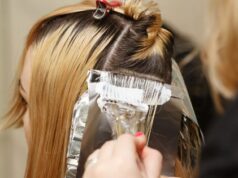Dental health is very important for our general health. Proper oral hygiene and dental care are necessary to keep your teeth and gums healthy. You need a good dental hygiene routine in between dentist’s appointments to prevent your teeth from decay. Tooth decay occurs when there is poor dental hygiene, like not brushing your teeth after eating. Bacteria turns the remains of food into acid, and everything combined in your mouth creates plaque. The acids in plaque dissolve the enamel surface of your teeth, which leads to cavities. Brushing your teeth is essential, but there are other tips for preventing teeth decay. Read on to see 10 daily dental health advice.


Brush Your Teeth Properly
We all know that brushing our teeth is essential for good health and preventing cavities. It’s important that we brush our teeth twice a day. But a problem we have is that we are always in a rush, and we don’t brush our teeth long enough or we don’t use the correct technique. A proper technique involves brushing in small circular motions. You have to make sure you are brushing the front, back, and top of every tooth. You should brush for 2 to 3 minutes in total. If you brush too hard or use back-and-forth motions, you can damage your tooth enamel and gums.
A brush with hard bristles is not necessary and it will not help you in cleaning your teeth better. It can only hurt your gums and enamel, resulting in damage and gum erosion. It’s recommended that you use a soft-bristled brush, and change it every three months. There are also many good electrical toothbrushes on the market, which are also very good at cleaning your teeth.
Taking care of your children’s teeth is also very important for their health. Even though they have „baby teeth“, they are just as important as adult teeth. They are the placeholder for future permanent teeth. It’s vital to introduce proper oral hygiene at the youngestage. Baby’s gums should be wiped with a warm, wet cloth to remove sugar from gums. Once a baby has teeth, they should be brushed with a baby toothbrush. Use a very tiny amount of toothpaste. Children from age 3 to 6 should use a pea-sized amount of toothpaste. Make sure they clean their teeth properly until they learn and create a habit.
Use Floss
Flossing is another essential part of your dental care routine. Flossing should be done once a day, preferably at night. Flossing removes plaque and bacteria from between your teeth. A toothbrush is unable to reach those spaces, so using floss will help you in removing buildup. Food gets trapped between your teeth, so if you don’t use floss, you are more prone to having plaque and cavities. If you don’t use it properly, you can hurt your gums.
A recommended technique is to gently push down the flow to the gumline and then enclose the side of the tooth with up and down motions. Be gentle to prevent hurting your gums. Also, don’t snap your floss between your teeth. It won’t clean them properly and you can hurt your gums.
Use Fluoride
Fluoride comes from an element called fluorine. It helps with preventing cavities, and it’s a very common ingredient in toothpaste and mouthwash. Lack of fluoride can lead to tooth decay, even if you properly brush your teeth. Many cities add fluoride to tap water, so it’s a good resource of taking fluoride. Bottled water usually doesn’t have fluoride. There are also fluoride treatments to help you strengthen your teeth and prevent tooth decay. Ask your dentist for a fluoride treatment to protect your smile and strengthen your teeth.
See a Dentist
It’s recommended that you visit your dentist every six months for a checkup. Visiting your dentist regularly can help you prevent any serious issues with your oral health. The dentist will check you for signs of cavities, gum disease, and other oral health issues. If they suspect a dental cavity, you will maybe have to do an x-ray of your tooth. On your regular checkups, you can ask for teeth cleaning, which will remove plaque and tartar from your teeth and give you a super clean feeling.
Your dentist will answer any questions you may have about your dental health. They will give you all the necessary advice and recommendations. This can includeproduct recommendations, care instructions and technique advice for brushing your teethand flossing. If you have teeth add-ons like crown, bridgework, veneers, and braces, you will probably need a more specific dental hygiene process. You will have to make sure they are properly cleaned, and that you’re not doing any damage. Braces can be a bit difficult to work with because of all the tiny wires and gaps. Make sure you always have interdental toothbrushes with you so you can clean your teeth if you are not at home. Leaving your teeth and braces dirty can result in a buildup of plaque and tooth decay.
If you take care of your teeth regularly and properly, you won’t have to go as often to the dentist. If you are unsure of how regularly you have to go, you can speak to your dentist. They will take into consideration your dental health history, age, and dental hygiene. If you have a history of dental problems, you will probably have to go often for checkups. Always go to the dentist if you see something is happening with your dental health, or if you have pain when eating and drinking.
Use Mouthwash
A good addition to your dental care routine is a mouthwash. Remember that they cannot replace regular brushing and flossing, but they can be a good help in your care. They can greatly benefit oral health. Almost all of the mouthwashes in the market contain antibacterial ingredients that can control plaque and remove germs that you can’t destroy with a toothbrush. Some mouthwashes also have essential oils that can help increase your dental health. Since there are many different types of mouthwash to choose from, it’s best to ask your dentist which ones he recommends based on your needs and dental health. Mouthwashes also help in combating bad breath. It’s not recommended for very young children to use mouthwash. It can be harsh on their teeth, and there is a chance that they swallow it. Leave it for a bit older age.
Limit Sugar Intake
Sugar and other carbohydrates and starches can lead to cavities. If your diet consists of a lot of carbohydrates, consider altering your eating habits to include more fruits and vegetables. Sugar plays a big role in destroying out dental health and creating cavities. Besides candy and desserts, sugar is hidden in many processed food that appears to be salty. Store-bought fries are one of them. Many of us have a very big intake of sugar, which not only destroys our teeth but overall health. Starchy food like bread, chips, and pasta can also help in tooth decay. They break down into simple sugars in our mouth, feeding bacteria and causing tooth decay and cavities.
If you are eating acid food and drinks, don’t brush your teeth immediately after. The acids dissolve the calcium on the surface of your teeth and you can take that layer right off, causing enal erosion after some time. Your saliva has a neutralizing effect that needs about one hour to reverse the effect acid had on your teeth. Wait for at least half an hour to an hour before brushing your teeth after drinking acidic beverages or eating acidic food.
Watch What You Drink
The best drink we can have is water. It’s healthy, it doesn’t have sugar or other bad substances, and it helps us in many ways. Many people opt for juices or soda instead of when they are thirsty. The problem is that they can contain a very big amount of sugar in one glass of drink, up to 30 grams per glass. That is a lot of sugar that you can’t necessarily see, and maybe don’t think about. Acidic and sugary drinks hurt and stain your teeth and promote the growth of bacteria and tooth decay. Drinking a lot of coffee and tea can also stain your teeth, but’s it’s not as bad as carbonated and sugary drinks. For every cup of coffee or tea, drink an additional glass of water to keep hydrated. Drinking water also promotes the making of saliva, that can combat sugar and germs in your mouth. Train yourself to drink water instead of soda and juice.
Do Not Smoke
Smoking can cause many different health problems. Smoking is bad for your general health and it can harm almost every organ in our body. It leads to many diseases that go from lung cancer, throat cancer, and oral cancer. These are just some of the diseases you can get from smoking. Oral-vise, smoking not only causes stains on your teeth, but it can also create gum disease, tooth loss, and even oral cancer. Using any form of tobacco has a bad effect on our health. Smoking also harms and weakens your body’s immune system, and it becomes difficult for your body to heal. This means that any dental health problems you have, your body won’t be able to fight them or have prolonged health, including the healing of tissues. If you have had a dental procedure, it also slows down healing.
Consider Dental Sealants
To prevent food trapping in your teeth, you can ask your dentist for dental sealants. Dental sealants are a plastic protective coating that is usually applied to chewing surfaces on your back teeth. Back teeth, or molars, are prone to getting cavities and other health issues because we often skip them when brushing teeth, or we don’t brush them enough. Dental sealants can seal little holes, nook, and crannies in your teeth to prevent food from getting trapped. Getting dental sealants is not very difficult, and they can last you for many years if you have good dental hygiene and care. They also help you in preventing tooth decay and other dental issues. Besides dental sealants, ask your doctor for the best dental products for your everyday use, like Care Dent toothbrushes and floss.
Seek Treatment for Emergencies
Besides the regular checkups, if you experience any type of tooth pain, make sure that you contact your dental office or dentist to schedule an appointment. When our teeth hurt, it usually means there is something serious happening, like tooth decay and cavities that have been in the making for some time, but we didn’t notice them. If you leave your teeth and pain untreated, it can create major problems for you that can leave you with tooth loss or big surgeries. Smaller cavities usually don’t hurt as much, but they can advance very quickly and get to the root of your tooth. A decayed and sick root can cause a lot of pain, and you may even lose your tooth because of it.If you take your time and properly clean your teeth, you will see that your dental appointments are going very smoothly without any bigger issues. Remember, it’s never too late to start taking care of your smile.
If you follow these tips and advice on a regular basis, you will surely have strong and healthy teeth and good dental health overall. Besides taking care of your dental hygiene, you should visit your dentist every six months, or at least one a year for a checkup. You will get a checkup of your teeth and oral health, and maybe some advice on how to continue your care. If you are really good at taking care of your oral health, you probably won’t have to go to the dentist as often. Beware of sugary and acidic food and beverages, as they can seriously damage your teeth. Your smile is very important for your health and appearance, so take good care of it.









